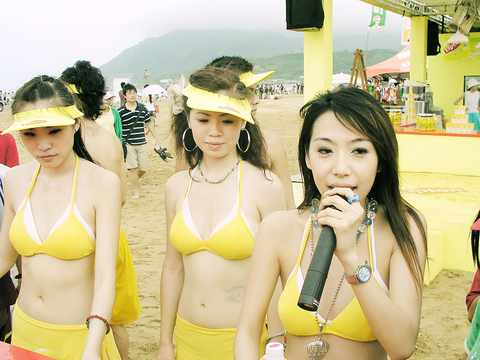First it was going to happen, and then it wasn't going to happen until later, then it did happen for a bit, and now it's canceled -- but only for now. The annual Ho-Hai-Yan beachside brouhaha (海洋音樂祭2005) got off to a start at Fulong (福隆) on Wednesday, two weeks after the original scheduled date and despite a host of problems, the last of which was a thundershower, the precursor of another typhoon.
Organizers were forced to cancel performances for last night and tonight. And as of press time last night, the official word was "wait and see" about shows scheduled for tomorrow and Sunday.
At least a fortunate few made it out on Wednesday for some five hours of live music that was originally supposed to last five days. A late afternoon rainstorm threatened to have the modest crowd head for home, but by 6pm, the rain had subsided, the bands had plugged in and the beach was booming.

PHOTO: TAIPEI TIMES
The beach itself figured prominently in the proceedings even before the party began. Long Taipei County's most popular beach, Fulong has in recent years been the site of substantial development built to accommodate weekend crowds. The scene here changed last year when the beach disappeared as a result of tidal changes caused by the construction of a wharf to service the Fourth Nuclear Power Plant.
When organizers began planning this year's Fulong festival, there wasn't much of a beach on which to put it. Indeed, the bridge that is the site's centerpiece led out to open water only weeks ago, according to organizers.
But any thought Wednesday night's partygoers might have had of wading out to the man-made peninsula was cut short at the tape lining the water's edge and by the guards standing sentry to prevent any would-be wading.
One concertgoer said that police were being overzealous and mentioned another beach party she attended at Baishawan two weeks ago, where police had also cordoned off the water.
"I don't understand the point of having [concerts and parties] at the beach if the police won't let you even get your feet wet," she said.
Later a voice announced that MC Hotdog was about to play and partygoers stopped messing about in the sand and sidled up to the front of the Big Blue stage.
Anyone who wasn't on their feet for his first number was for his second, I Love Taiwanese Girls (
"Why isn't Da Zhi more popular than MC Hotdog?" was one comment overheard. "He's so cool."
"He's so song!" was her friend's answer. Maybe a bit too "crude."
That's never stopped a hip-hop artist before.
Back on the main beach, a laundry list of smaller-name bands did their best to battle against the cacophony of sound coming from the main stage. With only their friends and family to block the noise, it was a losing battle.
Despite the first typhoon that postponed the festival, most of the international headliners were still able to play on the new dates. Only Canadian rapper Peaches had to bow out. Organizers made no mention of again rescheduling international acts, including Vincent Gallo, Melissa auf der Maur, Japan's Boom Boom Satellites, Baseball from Australia and Black Rebel Motorcycle Club from the US.
Visit http://hohaiyan.com/2005.htm for the latest on cancellations and rescheduling.

Towering high above Taiwan’s capital city at 508 meters, Taipei 101 dominates the skyline. The earthquake-proof skyscraper of steel and glass has captured the imagination of professional rock climber Alex Honnold for more than a decade. Tomorrow morning, he will climb it in his signature free solo style — without ropes or protective equipment. And Netflix will broadcast it — live. The event’s announcement has drawn both excitement and trepidation, as well as some concerns over the ethical implications of attempting such a high-risk endeavor on live broadcast. Many have questioned Honnold’s desire to continues his free-solo climbs now that he’s a

Francis William White, an Englishman who late in the 1860s served as Commissioner of the Imperial Customs Service in Tainan, published the tale of a jaunt he took one winter in 1868: A visit to the interior of south Formosa (1870). White’s journey took him into the mountains, where he mused on the difficult terrain and the ease with which his little group could be ambushed in the crags and dense vegetation. At one point he stays at the house of a local near a stream on the border of indigenous territory: “Their matchlocks, which were kept in excellent order,

Jan. 19 to Jan. 25 In 1933, an all-star team of musicians and lyricists began shaping a new sound. The person who brought them together was Chen Chun-yu (陳君玉), head of Columbia Records’ arts department. Tasked with creating Taiwanese “pop music,” they released hit after hit that year, with Chen contributing lyrics to several of the songs himself. Many figures from that group, including composer Teng Yu-hsien (鄧雨賢), vocalist Chun-chun (純純, Sun-sun in Taiwanese) and lyricist Lee Lin-chiu (李臨秋) remain well-known today, particularly for the famous classic Longing for the Spring Breeze (望春風). Chen, however, is not a name

There is no question that Tyrannosaurus rex got big. In fact, this fearsome dinosaur may have been Earth’s most massive land predator of all time. But the question of how quickly T. rex achieved its maximum size has been a matter of debate. A new study examining bone tissue microstructure in the leg bones of 17 fossil specimens concludes that Tyrannosaurus took about 40 years to reach its maximum size of roughly 8 tons, some 15 years more than previously estimated. As part of the study, the researchers identified previously unknown growth marks in these bones that could be seen only